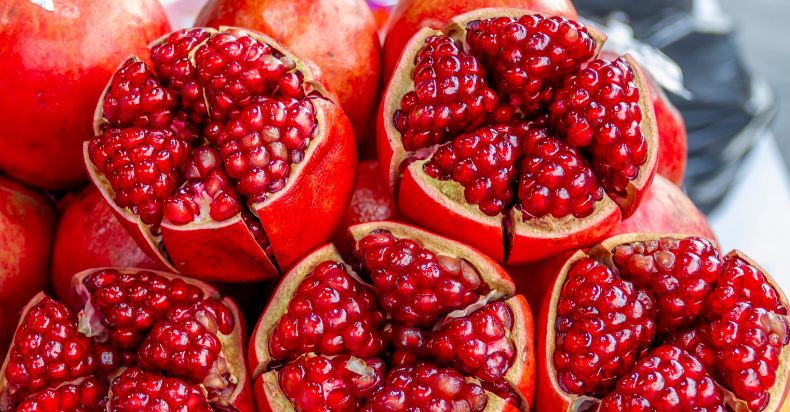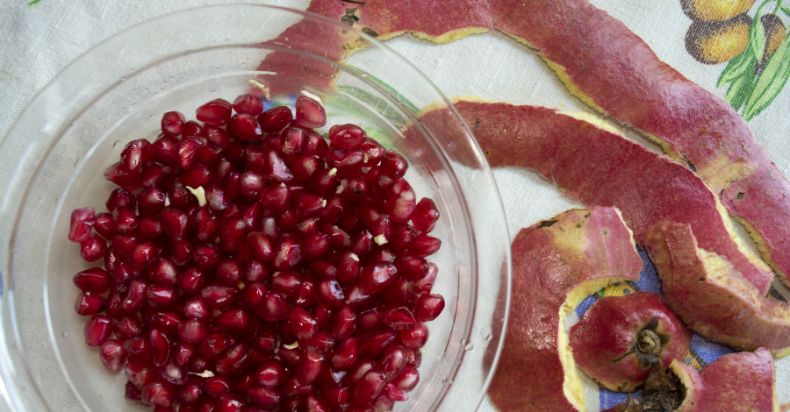The short answer is yes. Pomegranate skin is safe to eat, and it might even offer some health benefits. It’s packed with antioxidants and other compounds that could potentially help protect against diseases like heart disease and cancer.
In this article, we’ll explore the safety and potential health benefits of eating pomegranate skin. We’ll delve into the science behind it, and even give you some tips on how to incorporate it into your diet, if you’re feeling adventurous. So, without further ado, let’s dive in!
Alright, let’s get this party started! You’re here because you’ve got a burning question on your mind: “Is it safe to eat pomegranate skin?” It’s a bit of an odd question, huh? But hey, we’re not here to judge. We’re here to answer your food-related queries, no matter how quirky they might be.
Pomegranates are a bit like the Rubik’s cubes of the fruit world. They’re tricky to figure out, but oh-so-satisfying once you do. You’ve probably mastered the art of eating the juicy seeds (or arils, if you want to get technical), but what about the skin? Can you eat that too? Or is it destined to be discarded, like the wrapper of a candy bar?
Well, my curious friend, you’re about to find out. Buckle up, because we’re about to embark on a culinary adventure into the world of pomegranates. And trust me, it’s going to be a wild ride.
The Pomegranate: A Fruit Full of Surprises

Now, before we delve into the nitty-gritty of pomegranate skin, let’s take a moment to appreciate the pomegranate itself. This fruit is a bit of a show-off, don’t you think?
With its vibrant red color and its crown-like stem, it’s like the royalty of the fruit world. And that’s before we even get to the inside!
Crack open a pomegranate, and you’re greeted with a treasure trove of ruby-red seeds. These seeds are not just pretty to look at, they’re also packed with nutrients. We’re talking vitamins C and K, fiber, and a whole host of antioxidants. It’s like a health food store in a fruit!
But here’s where things get interesting. You see, when we talk about eating pomegranates, we usually mean the seeds. But what about the rest of the fruit? What about the skin that houses these precious seeds? Is it safe to eat pomegranate skin?
Well, that’s the million-dollar question, isn’t it? And it’s the question we’re going to answer in this article. So, keep reading, because things are about to get juicy!
READ : Why Does Kiwi Burn My Mouth?
Is It Safe To Eat Pomegranate Skin?
Alright, let’s get down to business. You’re here because you want to know, “Is it safe to eat pomegranate skin?” Well, the short answer is yes. But, as with most things in life, it’s a little more complicated than that.
First off, let’s talk about the texture. If you’ve ever handled a pomegranate, you’ll know that the skin is pretty tough. It’s not like the soft, edible skin of an apple or a pear.
It’s more akin to the rind of a watermelon or a cantaloupe. You could eat it, sure, but it might not be the most pleasant experience.
Then there’s the taste. Pomegranate skin has a bitter flavor that’s a far cry from the sweet, tangy taste of the seeds. It’s a bit of an acquired taste, to say the least.
But here’s the thing: just because something isn’t tasty doesn’t mean it’s not nutritious. In fact, some studies suggest that pomegranate skin might be even more nutrient-dense than the seeds. So, if you’re willing to brave the bitter taste, you might reap some health benefits.
However, it’s important to note that more research is needed to fully understand the potential health benefits of eating pomegranate skin. So, while it’s safe to eat, it might be best to do so in moderation until more is known.
So, there you have it. Yes, it’s safe to eat pomegranate skin, but whether you’d want to is another question entirely. But hey, if you’re a culinary adventurer, why not give it a try? You never know, you might discover a new favorite snack!
Potential Health Benefits of Pomegranate Skin

So, we’ve established that it’s safe to eat pomegranate skin. But is it worth it? Are there any health benefits that could make braving the bitter taste and tough texture worthwhile? Well, let’s take a look at what the science says.
First off, pomegranate skin is rich in antioxidants. In fact, some studies suggest that the skin might contain even more antioxidants than the seeds.
Antioxidants are compounds that help protect your cells against damage from harmful molecules called free radicals.[source]
So, eating antioxidant-rich foods like pomegranate skin could potentially help protect your body against diseases like heart disease and cancer.
In addition to antioxidants, pomegranate skin also contains a compound called ellagic acid. This compound has been shown to have anti-inflammatory and anti-cancer properties.[source]
So, eating pomegranate skin could potentially help reduce inflammation and protect against cancer.
But here’s the catch: while these potential health benefits sound promising, more research is needed. Most of the studies on pomegranate skin have been done in test tubes or on animals, not humans.
So, while the results are promising, we can’t say for sure that the same benefits would apply to humans.
So, is it worth eating pomegranate skin for the potential health benefits? Well, that’s a decision you’ll have to make for yourself.
If you don’t mind the bitter taste and tough texture, it could be worth a try. But if you’re not a fan, don’t worry. There are plenty of other antioxidant-rich foods out there that you can enjoy instead.
READ : Is It Safe To Eat Broccoli With Brown Spots?
The Science Behind the Skin
Now that we’ve covered the potential health benefits of pomegranate skin, let’s delve a little deeper into the science behind it. After all, it’s all well and good to say that something is packed with antioxidants, but what does that actually mean?
Antioxidants are compounds that help protect your cells from damage caused by free radicals. Free radicals are unstable molecules that can cause damage to your cells if their levels become too high in your body. This damage can lead to chronic diseases like heart disease and cancer.
Pomegranate skin is rich in several types of antioxidants, including tannins, flavonoids, and ellagic acid. These antioxidants have been shown to have anti-inflammatory and anti-cancer properties in some studies.
For example, a study published in the Journal of Agricultural and Food Chemistry found that pomegranate peel extract had higher antioxidant activity than extracts from the pulp or seeds. [source]
Another study published in the Journal of Medicinal Food found that pomegranate peel extract could inhibit the growth of cancer cells in a lab setting.[source]
However, it’s important to note that these studies were done in a lab, not on humans. While the results are promising, more research is needed to understand how eating pomegranate skin might affect human health.
So, while the science behind pomegranate skin is fascinating, it’s still in the early stages. But who knows? With more research, we might find that this often-discarded part of the pomegranate is a nutritional powerhouse.
How to Incorporate Pomegranate Skin into Your Diet
So, you’ve made it this far and you’re thinking, “Alright, I’m game. I’ll give this pomegranate skin thing a try.” Good for you! You’re a true culinary adventurer. But now you’re probably wondering, “How the heck do I eat this stuff?” Well, don’t worry, I’ve got you covered.
First off, you’ll want to make sure you wash the pomegranate thoroughly. The skin can sometimes be coated in a waxy substance, and you’ll want to remove that before you start munching.
Next, you’ll need to get past the tough texture. One way to do this is to dry out the skin and then grind it into a powder. You can do this by baking the skin in the oven at a low temperature until it’s dry and brittle. Then, use a coffee grinder or a food processor to grind it into a fine powder.
Now, you’re ready to start incorporating pomegranate skin into your diet. Here are a few ideas to get you started:
- Add it to smoothies: A spoonful of pomegranate skin powder can add a nutritional boost to your morning smoothie. Just be aware that it might add a bit of a bitter taste, so you’ll want to pair it with sweet fruits like bananas, mango fruit or strawberries to balance it out.
- Sprinkle it on salads: Pomegranate skin powder can add a unique flavor and a nutritional punch to salads. Just sprinkle a little on top, like you would with cheese or nuts.
- Mix it into yogurt or oatmeal: For a quick and easy breakfast, mix some pomegranate skin powder into your vegan yogurt or oatmeal. It’ll add a bit of a crunch and a lot of nutrients.
Remember, a little goes a long way with pomegranate skin. Start with a small amount and see how you like the taste and texture. You can always add more if you want to.
So, there you have it. Eating pomegranate skin might seem a little strange at first, but with a little creativity, you can turn it into a tasty and nutritious addition to your diet. Happy eating!
Final Thoughts:
Well, we’ve come to the end of our culinary adventure. We’ve explored the world of pomegranates, delved into the science behind the skin, and even learned how to incorporate it into our diets. So, what’s the final verdict? Is it safe to eat pomegranate skin?
The short answer is yes. Pomegranate skin is safe to eat, and it might even offer some health benefits. It’s packed with antioxidants and other compounds that could potentially help protect against diseases like heart disease and cancer.
But, as with most things in life, it’s not quite that simple. The skin is tough and bitter, which might not be to everyone’s taste. And while the potential health benefits are promising, more research is needed to fully understand them.
So, should you start munching on pomegranate skin? Well, that’s a decision only you can make. If you’re a culinary adventurer who doesn’t mind a bit of a bitter taste, then go for it! But if you prefer to stick to the sweet, tangy seeds, that’s perfectly fine too.
In the end, the most important thing is to enjoy your food. Whether you eat the skin or not, pomegranates are a delicious and nutritious addition to any diet. So, go ahead and enjoy this fruity treasure, in whatever way you like best.
FAQs
Can I eat pomegranate skin?
Yes, it’s safe to eat, but it has a strong, bitter flavor.
Is pomegranate skin good for you?
It’s packed with antioxidants, but more research is needed to fully understand its health benefits.
How can I eat pomegranate skin?
Try drying it out and grinding it into a powder. You can then add it to smoothies, salads, or yogurt.
Is pomegranate skin poisonous?
No, it’s not poisonous, but it’s not commonly eaten due to its tough texture and bitter taste.
Q: What happens if I eat pomegranate skin?
You might find it bitter and tough, but it’s not harmful to eat. It could potentially offer some health benefits, but more research is needed to understand them fully.
